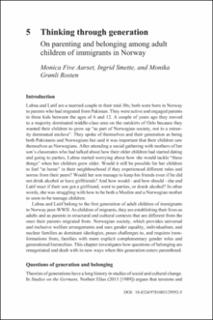| dc.contributor.author | Aarset, Monica Five | |
| dc.contributor.author | Smette, Ingrid | |
| dc.contributor.author | Rosten, Monika | |
| dc.date.accessioned | 2021-11-29T10:36:29Z | |
| dc.date.available | 2021-11-29T10:36:29Z | |
| dc.date.created | 2021-09-09T16:42:55Z | |
| dc.date.issued | 2021-09-13 | |
| dc.identifier.isbn | 978-0-367-65471-9 | |
| dc.identifier.isbn | 978-0-367-65475-7 | |
| dc.identifier.isbn | 978-1-003-12959-2 | |
| dc.identifier.uri | https://hdl.handle.net/11250/2831864 | |
| dc.description.abstract | In this chapter, we aim to contribute to discussions on generations in migration research by applying Norbert Elias’ and Karen Foster’s generation concepts to an investigation of descendants of immigrants’ experiences of parenthood in Norway. Directing attention to family practices in the so-called second generation may provide answers to the question of whether – and if so – in what ways second-generation parents can be seen driving forces of social dynamics in welfare states. On the individual level, however, parenthood may represent what Johnson-Hanks (2002) describes as a vital conjuncture, which arise in situations where previously assumed futures are called into question. Our analysis shows that the mothers and fathers in our material articulate both generational ruptures and continuities in their narratives on parenting and family practices. Their narratives reflect how belonging is renegotiated and put at stake in new ways when descendants of immigrants enter parenthood, thus challenging the premise of an either-or hypothesis of generational change or continuity. Our analysis further suggests that whether or not second-generation parents will be driving forces of social dynamics will depend both on the ability of descendants to acknowledge the yet undefined belongings of future generations and on the welfare state’s ability to incorporate complex belongings. | en_US |
| dc.language.iso | eng | en_US |
| dc.publisher | Routledge | en_US |
| dc.relation.ispartof | Generational Tensions and Solidarity Within Advanced Welfare States | |
| dc.rights | Attribution-NonCommercial-NoDerivatives 4.0 Internasjonal | * |
| dc.rights.uri | http://creativecommons.org/licenses/by-nc-nd/4.0/deed.no | * |
| dc.subject | Migration research | en_US |
| dc.subject | Immigrant children | en_US |
| dc.subject | Generations | en_US |
| dc.subject | Belonging | en_US |
| dc.subject | Second-generation parenthood | en_US |
| dc.subject | Cultural differences | en_US |
| dc.subject | Cultural contexts | en_US |
| dc.title | Thinking through generation: On parenting and belonging among adult children of immigrants in Norway | en_US |
| dc.type | Chapter | en_US |
| dc.type | Peer reviewed | en_US |
| dc.description.version | publishedVersion | en_US |
| dc.rights.holder | © 2022 individual chapters, the contributors | en_US |
| cristin.ispublished | true | |
| cristin.fulltext | original | |
| cristin.qualitycode | 2 | |
| dc.identifier.doi | https://doi.org/10.4324/9781003129592 | |
| dc.identifier.cristin | 1932949 | |
| dc.source.pagenumber | 79-95 | en_US |

